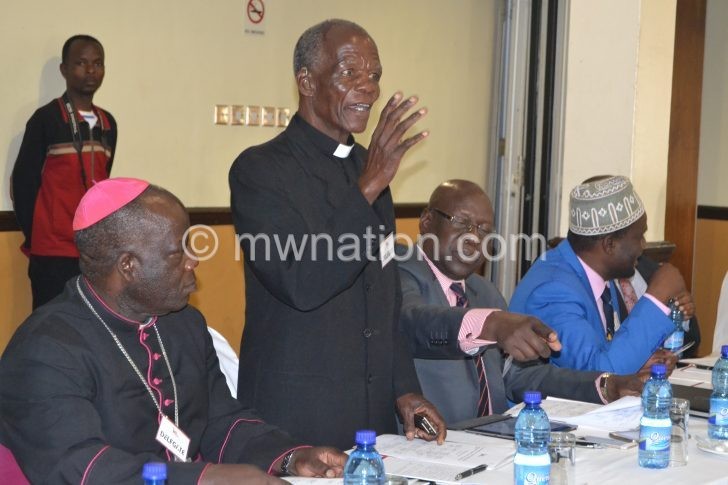PAC at crossroads
- Meetings provide platform to voiceless—Hussein
- Do not reflect church group—Bvumbwe
Opinions remain divided over the continuation of the Public Affairs Committee (PAC) all- inclusive stakeholders’ conferences whose future now lies in the organisation’s public persuasiveness on the indabas’ relevance.

While some appreciate the national gatherings for providing a platform to the voiceless to debate and suggest solutions to their challenges, others say they have no relevance to the citizenry.
The quasi-religious body just concluded its highly-emotional Sixth All-Inclusive Stakeholders Conference Thursday in Blantyre with delegates making several recommendations to President Peter Mutharika’s administration.
About 20 recommendations were made at the end of the two-day meeting under the theme ‘The State of Governance and Public Trust: Reclaiming our Destiny’.
The recommendations are expected to be reviewed by PAC secretariat and then adopted by its governing group before being forwarded to government for action.
However, these proposals are coming at a time government is sitting on some of the 21 resolutions PAC gave Mutharika after the Fifth All-Inclusive Stakeholders Conference in February last year.
Political analyst Mustapha Hussein feels PAC conferences remain fundamental platforms for the public as they project a common man’s view of how government or democracy is performing.
Hussein, a political science lecturer at Chancellor College, a constituent college of the University of Malawi (Unima), observed that PAC stakeholders’ conferences have raised decisive national issues that have grabbed government’s attention.
“These PAC conferences, whether they are liked by some quarters or not are very relevant because they contribute to the discourse on issues relating to our democracy.
“They are an important feature in our democratisation process because they provide a platform for the majority voiceless to appreciate the other side other than that of government,” he said.
Hussein cited a presentation made by law lecturer Garton Kamchedzera also of Chancellor College on public trust which touched on “sensitive” issues.
He noted: “That really raised eye-brows because it touched on some of the sensitivities and perceptions people have. So the success lies in the messaging and the passing it on to the government.”
But Hussein also stated that failure to implement or follow up on previous resolutions was a source of lessons regarding the strategies that PAC needs to be put in place.
But former PAC chairperson Bishop Joseph Bvumbwe said what has been happening at recent conferences vindicates his fears on the approach being employed at the events.
Bishop Bvumbwe alleged that the content at such conferences does not reflect on an organisation that is church-based but an opposition political party.
“What we have been fearing, all along and objecting to, is the approach being applied which leaves a lot to be desired, not that we were saying PAC is wrong.
“Is this the right approach a church should take when there are challenges in the country? My feeling is that all this can appropriately be done by opposition political parties. They don’t need PAC to be the channel for conveying their wishes,” he said.
He added: “Unfortunately when they convene at the conferences it is like all that is coming from a church based organisation and yet the content does not reflect on a religious body.”
The approach being referred to by Bishop Bvumbwe is where the conference delegates issue ultimatums or makes resolutions to have the President removed from office.
“As a church, I have always believed that our approach to issues should be peaceful by applying contact and dialogue. But if you look at the recommendations from the recent conferences, they are confrontational and aggressive, I don’t know whether that is a true representation of a church organisation,” he said.
The retired PAC chairperson said in his view since PAC started giving ultimatums to government, the conferences no longer bear the intended purpose. Besides, some stakeholders feel they are not given a chance to give their views.
True to his words, President Mutharika has firmly stated that his administration does not take deadlines from anyone.
Most of the recommendations made on Thursday by the delegates had timeframes of 30 days (one month) while one had 14 days (two weeks) for government to address.
The delegates even went further on some recommendations to say if they are not addressed “they may be forced to mobilise Malawians” and call for fresh elections.
Among others, the delegates want government to immediately open Chancellor College, trim down prices of maize, institute serious investigations into the murder of The Polytechnic student Robert Chasowa and Anti-Corruption Bureau (ACB) senior official Issa Njauju, establish a Public Appointments Commission, charge former Minister of Agriculture, Irrigation and Water Development George Chaponda for his alleged role in the Zambian maize imports saga.
PAC executive director Robert Phiri said in an interview yesterday his body would be meeting next week to analyse the recommendations before coming up with the resolutions.
“We will analyse those recommendations and then put them in a manner that will reflect a roadmap, which once prepared and adopted by PAC governance [trustees and executive committee members]—will be forwarded to government,” he said.
Phiri said he had informally engaged the presidential adviser on Non Governmental Organisations Mavuto Bamusi on the issue.
But Minister of Justice and Constitutional Affairs Samuel Tembenu said in an interview after the conference, government would take the recommendations with a sober mind while waiting for the resolutions from PAC.
Just like last year, tension was high at the conference after some delegates called for regime change.
However, during presentation of recommendations which came during plenary after delegates were divided into 10 clusters of similar interests no group called for the removal of Mutharika.






Bishop Bvumbwe at it again, trying to serve God and Mammon simultaneously.